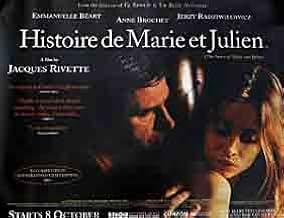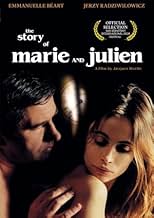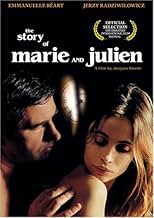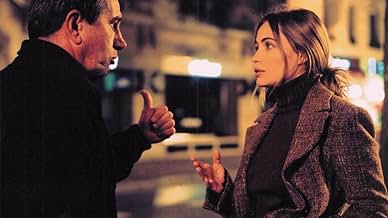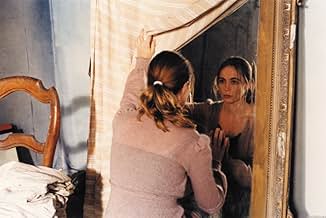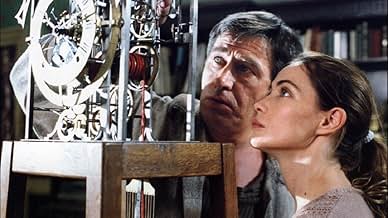अपनी भाषा में प्लॉट जोड़ेंMiddle-aged Julien lives alone with his cat. He dreams of Marie, and a few minutes later, he sees her on the street and makes a date. He asks her to move in with him, and she does. Her boyfr... सभी पढ़ेंMiddle-aged Julien lives alone with his cat. He dreams of Marie, and a few minutes later, he sees her on the street and makes a date. He asks her to move in with him, and she does. Her boyfriend is dead, the rest of her past a mystery. Although they quickly seem to fall in love, ... सभी पढ़ेंMiddle-aged Julien lives alone with his cat. He dreams of Marie, and a few minutes later, he sees her on the street and makes a date. He asks her to move in with him, and she does. Her boyfriend is dead, the rest of her past a mystery. Although they quickly seem to fall in love, she sometimes pulls away suddenly from him, is distant, and spends the night in a hotel. S... सभी पढ़ें
- पुरस्कार
- कुल 1 नामांकन
फ़ीचर्ड समीक्षाएं
It all comes down to casting the right woman because her male counterpart, though a better actor in this, is quite repulsive. Why cast an old, overweight and ugly man as the love interest of such a dreamy woman ? You don't want her being touched by that man and you can hardly believe she would love him so passionately since nothing about his looks or personnality make him stand out in a good way. Quite the opposite actually.
As for the story, it is really weird, if not completely absurd but again, with Béart as its main subject, you cannot stop watching.
So basically, if you are not a fan of hers, just walk away.
Can't they understand that, to share something with the others, it's important to have some ideas (just a small one, please...) about the movie itself? Do they think that when they proclaim their boredom they are giving to the world some kind of undisputed law?
Is it so difficult to understand that the Rivette work cannot be understood by the rules of mediocre entertainment? Is it so painful to address the simple idea that Rivette keeps filming the mystery of love? And that he doesn't want to bore us with the vulgar ideas of a vulgar TV-movie?
The result of this unveiling, this outwardly old man's return to purity, hope and youth, for those ready to receive it, is a movie that accomplishes what so many charlatans through history have promised -- it defeats death. If you don't shudder at Emmanuelle Beart's final line, if you don't get a frisson at the opening sound collage of car motors and pedestrian noise being swallowed up by a ghostly drone, that's fine, it just means you are being kept in the dark temporarily while you complete your mission, whatever that may be. It's not for me to blurt out in a review what Rivette knows must not be said directly. Well, not in a FREE Internet review, anyway.
P.S. See if, during one of the numerous sex scenes in this film, you can spot the oblique reference to Heinrich von Kleist's strangely cinematic play Penthesilea ( it dates from the early 19th century yet was considered unstageable then, being written like a modern film script with tons of brief scenes. ) I thought I was hallucinating this reference until I saw a Rivette documentary from 1990 where he talks about Kleist. The play, as everyone who has read it knows, is the greatest ever written about the damage that men and women do to each other on earth. That is half of what this film is about, too. The other half isn't about earth at all.
The film requires from its audience constant participation to grasp its narrative subtleties and the patent exploration of abstract concepts such as time (cf. the last line of the film is "give me some time"; Julien is a clock meddler), the fusion of dream and reality (the first chance meeting is initially dreamt but occurs immediately afterwards; Marie's dreams command her actions when awake), guilt and redemption (the subplot involving the blackmailed woman and their sister) etc. The cyclic structure of the film with four chapter denoting different, albeit subtle, shifts in narrative perspective invite the viewer to adjust his approach according to the tonal modulations of the unfolding story. The reflexive nature of the filmic story becomes, thus, a vehicle for self-examination on behalf of the viewer of held preconceptions and ideas related to the issues unravelled within the film.
A uniquely rewarding movie for those willing to be engaged in its narrative discourse. The work of a master.
क्या आपको पता है
- गूफ़When we see Marie choosing chairs to place in the garret, after she removes the second chair and returns to the garret empty-handed, a small stool is inexplicably where the chair had been.
- भाव
Marie: [during sex] I'm a warrior.
Julien: An amazon.
Marie: No. I keep my breasts for you, my friend. we're in the middle of a plain, a dessert.
Julien: Around us, a horde. It's our first battle.
Marie: I take over, come on top of you. I hunger for you. I eat you till I'm sick.
Julien: You tear me apart with your teeth, your nails.
Marie: You eat my sex.
Julien: It smells like wet soil. I stick my tongue and fingers in. Smell.
Marie: It's true. It smells like wet soil.
Julien: You faint. I take you in my arms. I take you...
Marie: Far... far from the battleground.
Julien: You wake up... you cry... scream.
Marie: You will deliver me.
- साउंडट्रैकOur Day Will Come
Written by Mort Garson and Bob Hilliard
Performed by Blossom Dearie with Joe Harnell et son quartet, Joseph Harnell (as Joe Harnell) (piano) - Dick Romoff (bass) - Ted Summer (drums) - Jerome Richardson (flute)
© 1962 publishing by Better Half Music and MCA Music Publishing (Renewed), A.D.O. Universal Studio
(p) DIW Records/disk union Co., Ltd.
Avec l'aimable autorisation de Unisersal Music projets spéciaux
टॉप पसंद
- How long is The Story of Marie and Julien?Alexa द्वारा संचालित
विवरण
बॉक्स ऑफ़िस
- दुनिया भर में सकल
- $66,543
इस पेज में योगदान दें


